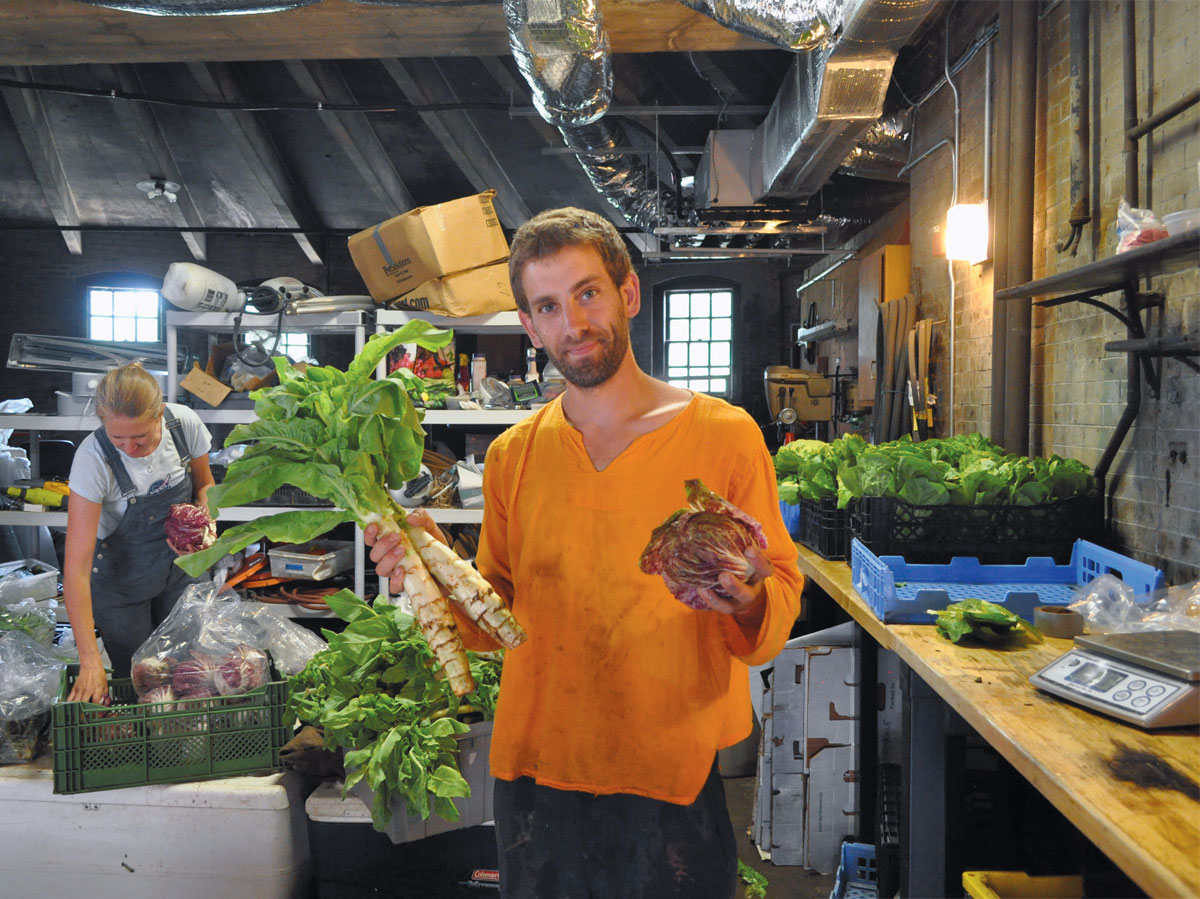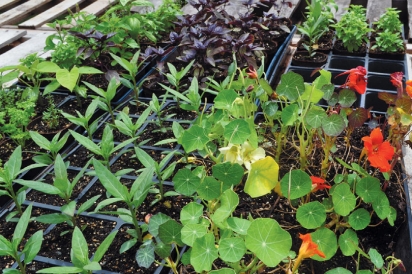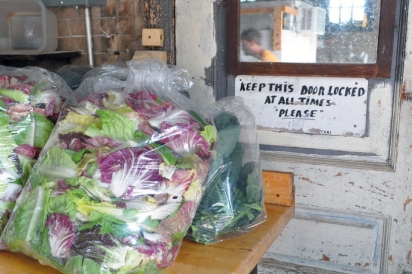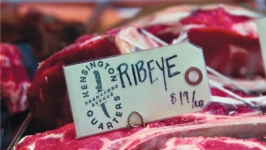The Call of the Dirt
The unlikely table-to-farm story of Jack Goldenberg and Plowshare Farms
It’s a solid bet that a ramshackle garage on the campus of Rosemont College in Bryn Mawr is not the first place that comes to mind when you think about locally grown produce. Of course, neither are the urban neighborhoods of Kensington or Germantown, but that’s where Jack Goldenberg is growing not only a stunning selection of fruits and vegetables but also an unusual business that is farm-to-table in the most literal sense of the words.
Dumpster Wine
Goldenberg’s story begins close to Rosemont, where he’s currently farming an acre of land with plans to expand through the seasons. The son of two doctors, Goldenberg grew up in Gladwyne and then headed to Kenyon College in Ohio, where he double-majored in philosophy and economics. In what he describes as “truly a Kafka-esque tragedy” involving one too many parties and a little bit of forgery, he was booted during his junior year. And as with most stories that involve getting kicked out of school, that’s exactly where things get interesting.
With a burgeoning interest in cooking and zero work experience, Goldenberg began working at a bar and grill in Wayne, where he landed the classic first restaurant job: a bottom-of-the-ladder gig combining floor mopping and dish duty. Regardless of the drudgework, Goldenberg came to love the kitchen dynamic he found there, that sense of really hard work mixed with fun and camaraderie that’s typical of the restaurant life. But he knew that he had a lot to learn if he ever wanted to cook professionally.
It wasn’t until some time later, when he was finishing up his philosophy degree at Villanova, that Goldenberg got serious about food and cooking. He managed to impress Chip Roman of Blackfish with his knowledge of sous vide and was offered a position at the acclaimed Conshohocken BYO. Looking back, he can’t fully explain where his impressive mastery of molecular gastronomy’s buzzwords even came from. He speculates it was the hours he spent glued to YouTube tutorials, obsessing over The French Laundry Cookbook and fooling around in his own kitchen.
Once installed at Blackfish, Goldenberg got a more formal education, in terms of both cooking and weird customs of professional cooking culture. “I made a lot of dumpster wine with Chip Roman,” he says. For those unfamiliar with this not very glamorous restaurant- industry hazing lingo, it’s basically jumping in the dumpster and stomping on the trash to make room for more.
Trash juice aside, Blackfish was a formative experience and a place where Goldenberg excelled. Christopher Kearse of Will BYOB was working there at the time and spotted Goldenberg’s talent immediately.
“[Kearse] was like, ‘What are you doing, man, don’t you want to be a chef?’ and I said, ‘I obviously do at this point, this job is dope. But I have to get this degree that I got my family to pay a lot of money for, it’s important,’ “ Goldenberg says.
After graduation, Goldenberg did one of the only things that you can do with a philosophy degree: He started his career as a cook. In short order, it took him everywhere from Le Bec-Fin to Talula’s Table in Kennett Square.
Yardening
The road from full-time cook to full-time farmer is a meandering one, but for Goldenberg it all started with a perfectly south-facing yard in Kensington and a trip to Home Depot. As he tells it, the though process was obvious: “I’m a cook, I should probably grow some vegetables.”
With a small yard planted with the usual seedling suspects from Home Depot, Goldenberg’s curiosity about cultivating grew, and he reached out to the professionals whom he came to know through working in restaurants.
“Ian Brendle [of Green Meadow Farm] was a big one. I’d call and ask him, ‘Why are my carrots [screwed] up?’ “ With expert advice, his skills slowly improved.
Goldenberg is a perfect case study of an autodidact, someone with a fierce I’m-going-to-figure-this-thing-out-myself mentality. With no gardening experience, he immersed himself in trade publications and growing manuals. He kept asking questions. He managed to transform his yard into a fully functioning and entirely viable garden; it was a micro farm, really. He regularly sold his produce to chef Chad Jenkins of Little Fish, the Queen Village restaurant where he was working at the time.
Double Agent
In addition to Little Fish, Goldenberg was also selling to Josh Lawler of The Farm & Fisherman. Lawler’s Pine Street BYO might be unassuming, but his résumé certainly isn’t. He ran the show at the Michelin- starred Blue Hill at Stone Barns in New York’s Hudson Valley for years before moving to Philadelphia to branch out on his own.
Lawler took Goldenberg on as a part-time cook and full-time supplier, allowing him to farm during the days and clock in kitchen time a few nights a week. Schedule-wise the arrangement wasn’t ideal, but for Goldenberg it was the best of both worlds. He was cooking and farming.
“I was drawn to Josh’s aura. I’d bring him my best vegetables and he’d buy all of them,” Goldenberg says. For Lawler’s part, well, he says that Goldenberg’s vegetables stood out—way out. It reminded him of the peerless produce the staff babied into existence back at Blue Hill. At the time, he wasn’t seeing much like it in southeastern Pennsylvania.
But it was more than just peerless produce that connected the two chefs. A spirit of collaboration emerged. Lawler’s respect for the ingredients led to him asking Goldenberg many very sincere questions: How’s the baby string bean dish? Is it good? Do you think it’s too simple? Is it a good use of your beans?
At first Goldenberg’s responses were dubious. “I’d be like, hey man, stop patronizing me. I’m just here to work,” he says. “That’s just how [Lawler] was. He wanted to know specifically from the guy who grew it, and that’s when I realized that this was the dream job.”
Huckster Wagon
What began as a backyard operation turned into a real-deal business venture with Goldenberg driving his pickup to clients’ restaurants to sell his wares.
“Back then I used to pull the truck up and say, ‘Here’s my stuff, what do you want?’ I could only sell what I could get rid of in a day.” It was during a series of informal ticketed dinners at Goldenberg’s house that he solidified his partnership with Teddy Moynihan, the other half of Plowshare.
Goldenberg met the former West Philly teacher and wrestling coach through a mutual friend, wild-foods forager David Siller. Moynihan was also farming in the city and Goldenberg offered to sell his produce along with his own.
“It made me look better to have more to offer,” Goldenberg explains. “His carrots were clean, they were beautiful, and he put a lot of care and attention into it. He was committed to growing something that people would want.”
With Goldenberg selling out of the back of his truck (or huckster wagon, as he refers to it), the entire business was contained in the confines of his Kensington row house.
The Perfect Partner
There was something of an aha moment during those first huckster days for Goldenberg. “That’s the cool thing about farming,” he says. “I need to be a carpenter, a plumber, a landscaper, a nurseryman, a harvester, a food processor, an accountant, a salesman, a delivery driver.”
And in December of 2014, his dream of balancing a restaurant life with a farming life turned into a reality when Plowshare became a growing business for him and Moynihan together.
In many ways Moynihan is the ideal partner for Goldenberg.
“Teddy talks about his love of multiplicity, about having rabbits as pets when he was a kid,” he says. “‘First we have two and then we have four and then eight. Why don’t we just breed and grow more of these things?’ I just don’t think like that. It came to me at the end of year one.”
Moynihan and his wife moved to Bucks County, where he’s farming a piece of land that came with a deed restriction that ensured that the land that he’s cultivating will remain a working farm.
Goldenberg still has plots in Germantown and Kensington, but the bulk of his time is spent at Rosemont, where he’s growing enough to support an impressive roster of clients that includes Fork, a.kitchen, Dizengoff, Pub & Kitchen and Russet, as well as a CSA and a weekly farmers’ market in Old City.
With plans to expand the operation at Rosemont, Goldenberg harbors continuing concerns about the future of Plowshare but at this moment, those concerns are mostly centered around seeking out new restaurants to buy up their bounty.
“We’ve passed a certain hump where I no longer fear for the existence of the business,” he says.
Isaiah 2:4
When it comes to the vision for Plowshare, the end game is producing healthy and nutritious food for people to enjoy, whether it’s through the CSA, farmers’ markets, or the city’s top restaurants.
The farm’s name comes from the Old Testament. “I’m not a religious guy, but for whatever reason I knew the ‘plowshares’ passage. I thought it was something that everyone knew,” says Goldenberg.
The name for their farm comes from the Old Testament and reads a little something like this:
And He shall judge among the nations, and shall rebuke many people: and they shall beat their swords into plowshares, and their spears into pruning hooks: nation shall not lift up sword against nation, neither shall they learn war any more.
“Whether you want to view it as though we’re farming for world peace or enjoying the fruits of our bounty causing us to realize that our suffering is pointless, the sign that the utopia is here is when we redirect our focus from machines of destruction to machines of life,” says Goldenberg. “It’s an affirming message.”
Plowshare Farms sells its produce at the farmers’ market at High Street On Market (308 Market St.) on Saturdays between 10:30am and 3:30pm, now through December 19.








